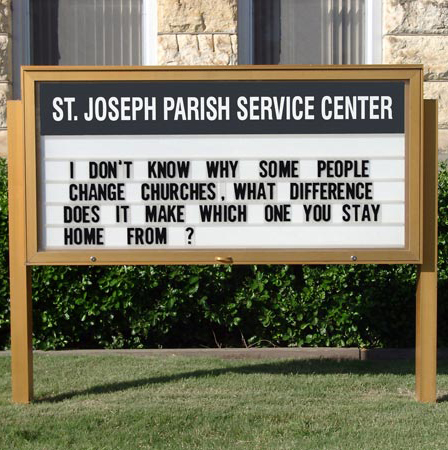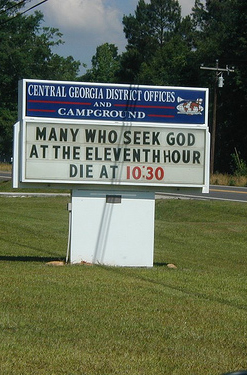 During my morning walk today, I must have passed at least half a dozen church buildings, each one with its own sign facing the road. Most of these were the backlit type with replaceable plexiglass letters that could be rearranged to spell out a new message each week. It was interesting to read each sign as I passed. I felt like it gave me a glimpse into the character of each congregation – or at least of the person who was in charge of updating the message!
During my morning walk today, I must have passed at least half a dozen church buildings, each one with its own sign facing the road. Most of these were the backlit type with replaceable plexiglass letters that could be rearranged to spell out a new message each week. It was interesting to read each sign as I passed. I felt like it gave me a glimpse into the character of each congregation – or at least of the person who was in charge of updating the message!
There was a pretty wide range of expressions on these signs, both in length and tone. One simply said, GOD CARES. Another warned that SECRET SINS ARE ONLY SECRET TEMPORARILY. The longest of the messages I saw was triumphal: THE HISTORY OF TOMORROW HAS ALREADY BEEN WRITTEN: EVERY KNEE MUST BOW AT THE NAME OF JESUS.

Passing each of the buildings and their signs, I felt uneasy, though at first I had a hard time figuring out why. After all, I didn’t disagree with any of the statements I read. I, too, believe that God cares deeply about us, that secret wrongdoing will be brought to light, and that Jesus has overcome the world. So why did these signs leave me feeling cold – even skeptical?
One of the key discoveries of the Quaker movement is that it is not enough to say the right words and believe the right doctrines. A statement can be true, yet spoken in a way that does not give life. The church signs I observed this morning were filled with insider-language, veiled threats and even statements that could be interpreted as self-congratulatory. These were messages designed – whether intentionally or not – primarily for the benefit of those who already believe, rather than as a genuine form of outreach to a world that does not follow Jesus.

Unfortunately, even if the messages displayed on these signs were pitch-perfect to the experience and needs of those outside the Church, the very format of church signs may be problematic. Take, for example, the sign that I considered the most accessible: GOD CARES.
This is a message that our hurting, lonely world needs to hear. Yet, we increasingly live in an age that does not take these kind of statements very seriously. After all, what does it mean that God cares? Who is God? What does it mean to care? A simple statement like God cares actually carries a huge number of hidden assumptions. In a society like ours, where universal understandings about religious truth are increasingly a thing of the past, such a statement demands a conversation.
This is challenging, of course, because conversation takes a lot more time and energy than simply putting up a pithy statement on a church sign. It also requires vulnerability. Conversations are two-way streets, and when we authentically engage with the world around us, we have to expect that our own worldview will be changed. Just because Jesus Christ is the Truth doesn’t mean that all of our beliefs are! Are we willing to do the kind of honest searching that real conversation will demand of us?

What are ways that we can be engaging in genuine conversations with our neighbors, friends and co-workers? What does it look like for us to be open to the truth that the Holy Spirit is revealing to those who have not yet chosen to follow Jesus? Are we ready to have our lives, our communities, and the Church as a whole changed by the experience, needs and insights of the world that God so loves? One thing is for sure: We’ll need more than church signs.
Wow. What about writing something like, “come on in… I have a coffee budget.”? Thanks for your insight!